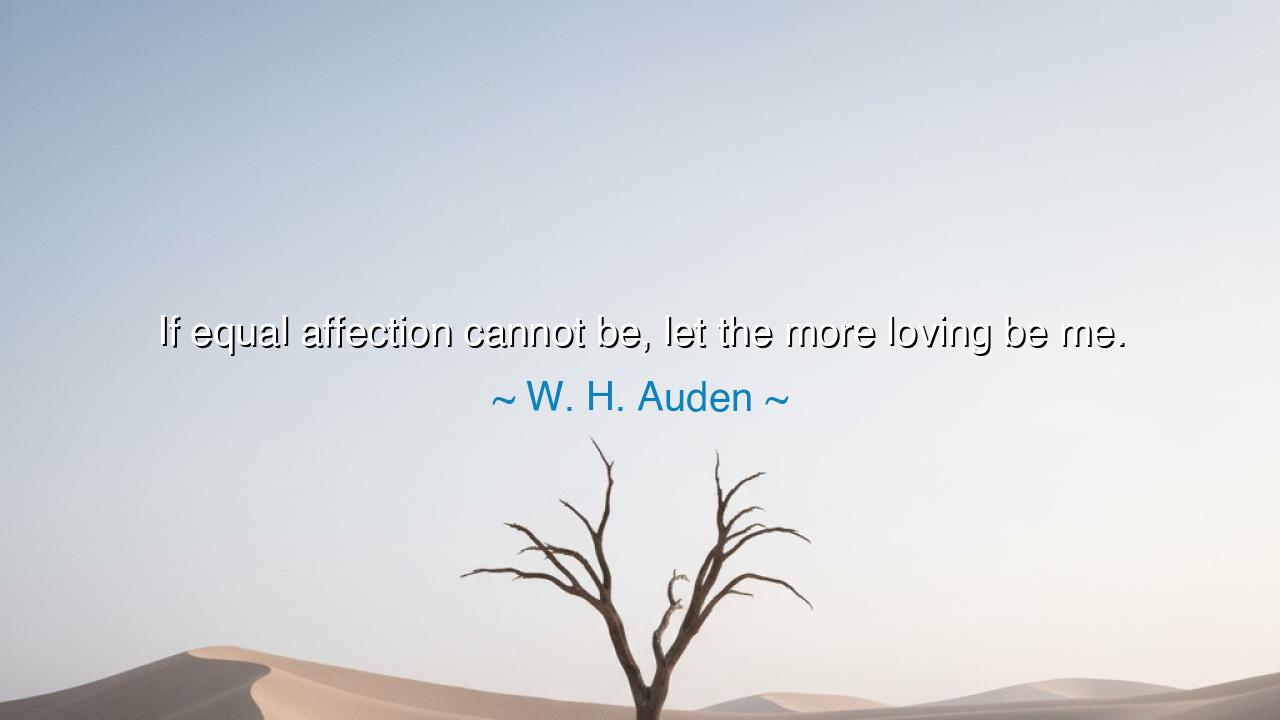
If equal affection cannot be, let the more loving be me.






"If equal affection cannot be, let the more loving be me." These words from W. H. Auden offer a profound insight into the nature of love and the power of selflessness. In the world of human relationships, equality in love is often an ideal we strive for, but it is not always achievable. At times, the affection we give may not be met in the same measure, and the reciprocity we hope for may not come to pass. Auden's words speak to the wisdom of accepting this reality, and more than that, they call for a higher response: if love cannot be returned equally, then let the one who loves most, love more. This is not a plea for martyrdom, but for the strength to give love unconditionally, to love beyond measure, and to allow that love to create its own equilibrium, even in the face of imbalance.
O children of the earth, understand this: the most powerful form of love is not that which is given in equal measure, but that which is given freely, without expectation or condition. In life, there will be moments when our love is not returned, when our affections are unreciprocated, or when we are met with indifference or even rejection. It is in these moments that we are called to be like Auden, to respond not with bitterness or withdrawal, but with greater love. The act of loving when it is not returned equally is a profound expression of the strength of the heart, and it is in this very selflessness that love becomes most transformative.
Consider the example of Nelson Mandela, whose love for his country and its people was not returned in equal measure during the years of his imprisonment. He endured unimaginable hardships, yet his love for the people of South Africa never faltered. Even when he was denied the right to see his family, even when he suffered in solitude, his commitment to love and justice was unwavering. When Mandela was finally released, he did not seek revenge on those who had wronged him; instead, he chose to extend forgiveness and to love those who had once oppressed him. In his actions, we see the embodiment of Auden’s words: even when the affection of others seemed unequal, Mandela chose to be the one who loved more. His love brought an entire nation together, and it was through selfless love that he helped to heal a deeply divided land.
Similarly, the life of Mother Teresa offers a shining example of love given unconditionally. She worked tirelessly, day after day, to care for the poor and the sick in the streets of Calcutta, never expecting anything in return. Her love was not always met with gratitude or recognition, yet she continued to serve with a heart full of compassion. Mother Teresa understood that love is not always about balance, but about the willingness to give love freely, without expectation. In her selfless giving, she created a profound impact on the world, showing us that the greatest love often arises in the face of imbalance, in the very places where we least expect it.
Auden's words also reflect the idea of strength in the face of unreciprocated love, a strength that does not retreat but steps forward with even greater resolve. The true test of love is not in how it is received, but in how it is given. When we love with all our hearts, regardless of the response, we become something greater than ourselves—we become the architects of a better world, one built on compassion, understanding, and forgiveness. In the face of love's challenges, we have the choice to either withdraw or to love more deeply, and it is in the latter choice that we find the true power of the human spirit.
O seekers of wisdom, take this lesson to heart: love is not always equal, but its power lies in the willingness to give love regardless of what we receive in return. In those moments when your love seems unreturned, choose to love more. In doing so, you will elevate not only the object of your affection but yourself, for love has the power to transcend boundaries and to create connections that are deeper and more lasting than those born of mere equality.
In your own life, when faced with moments of unequal affection, remember the example of Auden, and choose to love with greater depth. Do not wait for others to meet you halfway, but offer your love freely, knowing that in doing so, you create a space for healing and growth. Love is not about the balance of give and take—it is about the willingness to give, even when the scales are tipped. And in that giving, you will find that love has the power to transform, to build bridges, and to create a world where hearts are open, even in the face of hardship. Love freely, and you will discover that, in the end, love is always the answer, even when it seems like the question has no easy solution.






AAdministratorAdministrator
Welcome, honored guests. Please leave a comment, we will respond soon